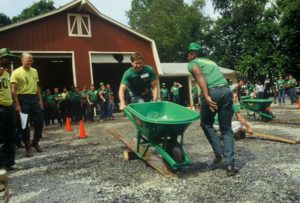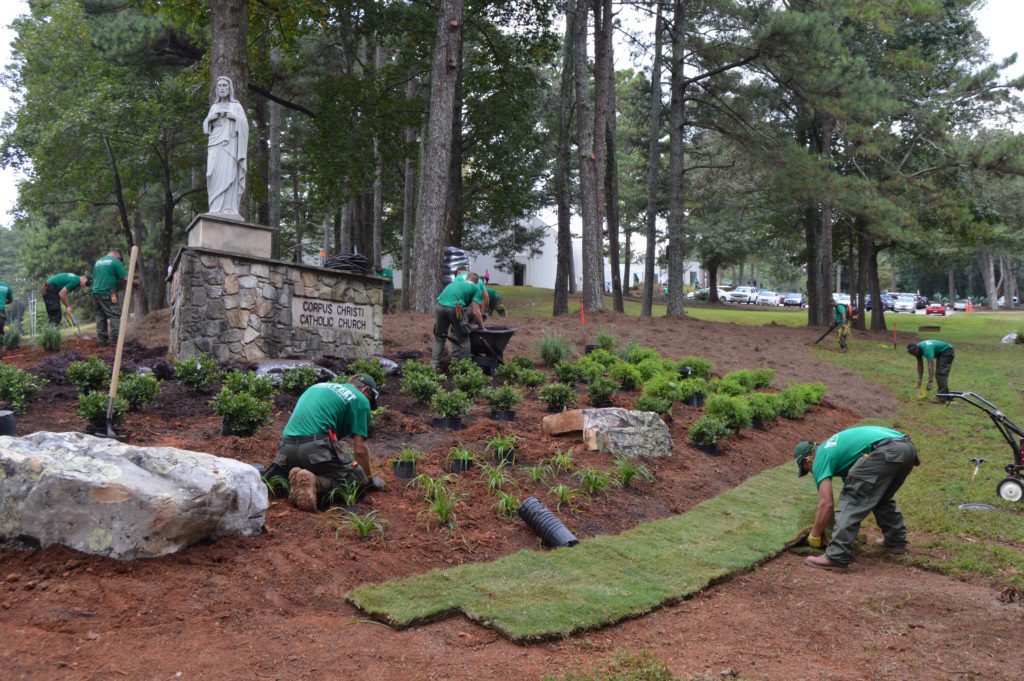 By Phil Key, President
By Phil Key, President
Many of you are familiar with our more recent Field Day events, which combine training, friendly competition, and community service. Before highlighting our most recent Field Day, I’d like to take a step back and share how this tradition began, how it has evolved, and how we will continue to scale this event as we grow.
The Early Years
 Field Day began in the early 90’s as a way to train employees on our standard operating procedures—for example, the “Ruppert way” to plant and stake a tree. We turned it into a competition between crews (rather than branches, as we only had a few back then), which helped make it challenging and fun. Early Field Days were held at the branch and the work we did had the added benefit of helping to spruce up our facility. As the company grew and branches became more dispersed, we’ve selected larger, centrally located sites and added in the community service aspect so that we could put our energy and resources to good use. Through these events we’ve benefitted numerous schools, parks and institutions, including (in recent years) Carroll Park (2014) in Baltimore and The Armed Forces Retirement Home (2015) in DC, which brought together over 550 employees.
Field Day began in the early 90’s as a way to train employees on our standard operating procedures—for example, the “Ruppert way” to plant and stake a tree. We turned it into a competition between crews (rather than branches, as we only had a few back then), which helped make it challenging and fun. Early Field Days were held at the branch and the work we did had the added benefit of helping to spruce up our facility. As the company grew and branches became more dispersed, we’ve selected larger, centrally located sites and added in the community service aspect so that we could put our energy and resources to good use. Through these events we’ve benefitted numerous schools, parks and institutions, including (in recent years) Carroll Park (2014) in Baltimore and The Armed Forces Retirement Home (2015) in DC, which brought together over 550 employees.
Scaling as we Grow
As we continue to grow, one of our ongoing objectives is to maintain our unique company culture. Many employees have told me that their experience with Field Day was a critical reason why they’ve stayed with the company—it demonstrated an investment in our people and our communities. This is why we’re committed to keeping this tradition alive.
In the past, our Field Day efforts have included a large share of our employees, which as we grow, greatly limits the sites that can accommodate us and how many people can participate. In light of this, we decided to experiment with a “mini Field Day” in 2016 at The Children’s Home in Catonsville, MD, which was more of a grassroots effort, incorporating teams from five local branches and just over 100 people. After the overwhelmingly positive response to this event, we have committed to doing more regional Field Days over the next few years. While we’re not going to rule out a company-wide effort in the future, these regional events will allow us to scale the event as the company grows, providing several key benefits:
- Enables more local, hands-on involvement. This allows employees to experience the feeling of goodwill that comes with doing something in their own community. Some of the feedback I’ve received is that people feel much more invested in the project when it’s right down the street from their branch or home instead of somewhere near our corporate office.
- Better facilitates training on regional areas of focus. Branches can customize the competitions as well as the pre-events—which begin months prior and evaluate things such as customer service, field quality, safety, facility, and vehicles/equipment—to fit the skills they want their teams to hone.
- Makes it much more manageable logistically. While still a considerably large event, this approach allows us to spread the planning amongst several branches, cut travel costs, reduce downtime, and redirect more funds towards giving.
- Allows greater participation by those who attend. With fewer people involved but a large scope of work to be performed, there is more opportunity for people to work vs. watch. This helps us better accomplish our goal of providing hands-on training for our people.
At its core, Field Day is not about how large the scope of work is or how many people attend—to achieve its purpose, it just needs to meet the three tenets of Field Day: training, camaraderie, and giving back.
2018 Field Day
 Earlier this year, we settled on the deep south as the host of our next regional Field Day. The organization which ultimately inspired us to select their site was Corpus Christi Catholic Church in Stone Mountain, GA. About 70% of Corpus Christi’s congregation is comprised of immigrants and refugees from 47 different countries who speak over 14 different languages. We felt like the site afforded us a great opportunity to use our skills and resources to benefit an organization that serves such a diverse community.
Earlier this year, we settled on the deep south as the host of our next regional Field Day. The organization which ultimately inspired us to select their site was Corpus Christi Catholic Church in Stone Mountain, GA. About 70% of Corpus Christi’s congregation is comprised of immigrants and refugees from 47 different countries who speak over 14 different languages. We felt like the site afforded us a great opportunity to use our skills and resources to benefit an organization that serves such a diverse community.
On September 13th, 100 employees from our Lilburn and Mableton, GA and Raleigh and Charlotte, NC maintenance branches and Georgia landscape branch descended upon the grounds of Corpus Christi. Site improvements included: planting over a dozen trees, 650+ shrubs and perennials; laying 18,000 SF of turf; installing 1,000 LF of drain pipe; installing 1,000 SF of concrete; laying 120 yards of mulch; and weeding, pruning, and mowing existing landscaping on the 7-acre site. The final touches included significant mature tree work and sealcoating and striping the parking lot. We worked with Corpus Christi to ensure that the site improvements aligned with their overall goal of transforming the church grounds into a welcoming environment for reflection and community-building.
I am extremely proud of what we’ve accomplished. Our investment was significant, with over 800 man-hours and over $100,000 worth of improvements to the site. All of the hard work during and leading up to this event culminated in a day that made a big difference for this community. Our hands-on involvement with projects like these enables us to use our skills in a very tangible way, creating a visible and lasting impact. Less tangible, perhaps, is that feeling of goodwill that I hope each of you experience as a result of your efforts, both when we are doing something special like Field Day and during our regular work days. Your hard work each and every day has an impact that is far greater than accomplishing a task or a receiving a paycheck. Remember that what you do, whether in the field or in the office, contributes to our success and in turn, is the reason we are able to give back to worthy causes like this and so many others. Our continued training and focus on communication, hustle and efficiency, teamwork, maintaining a sharp image, and giving back are just a few of the values that we have sharpened, showcased and shared throughout this process. I strongly feel that this new regional approach enables us to recapture the spirit of Field Day, have a greater personal impact on those involved, and retain our local presence as we grow. Thank you to everyone who helped make this Field Day a success!

 By Phil Key, President
By Phil Key, President